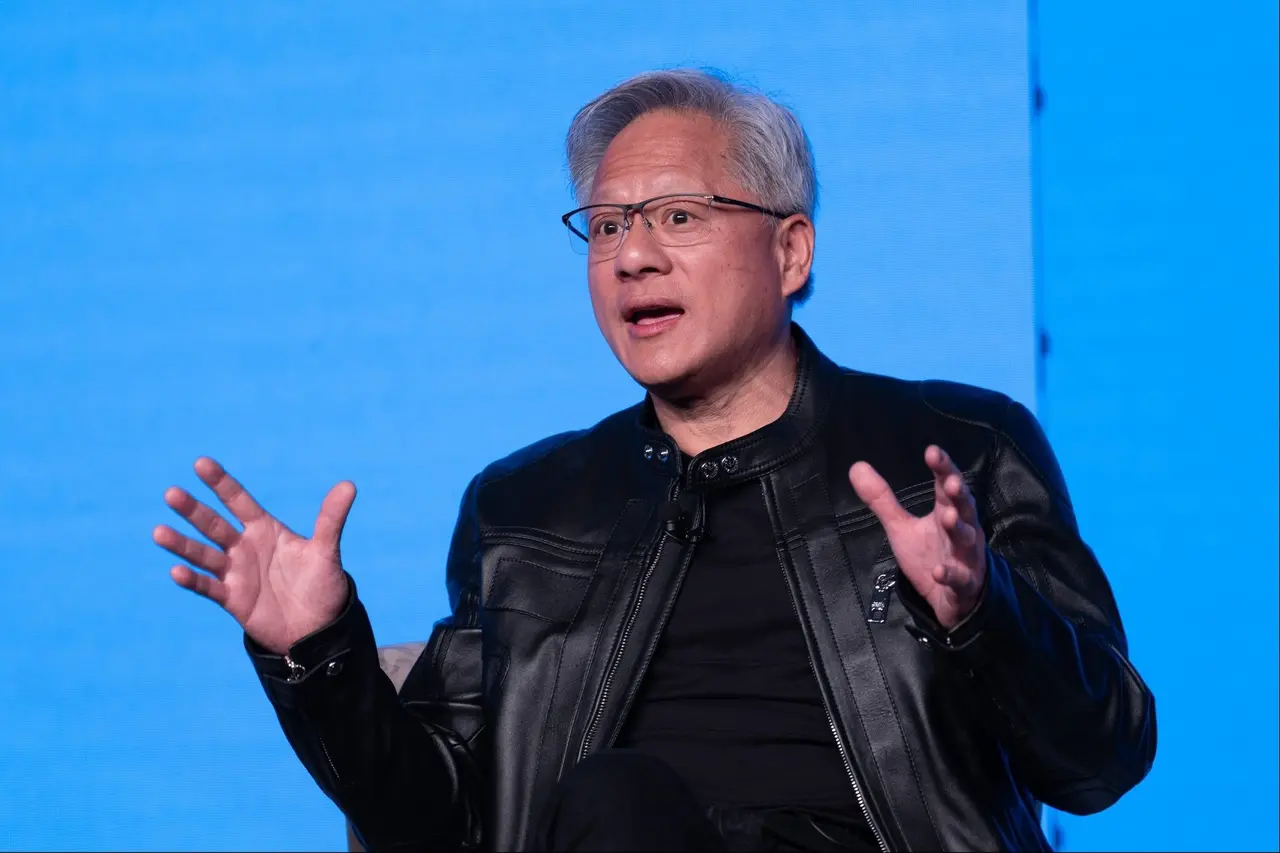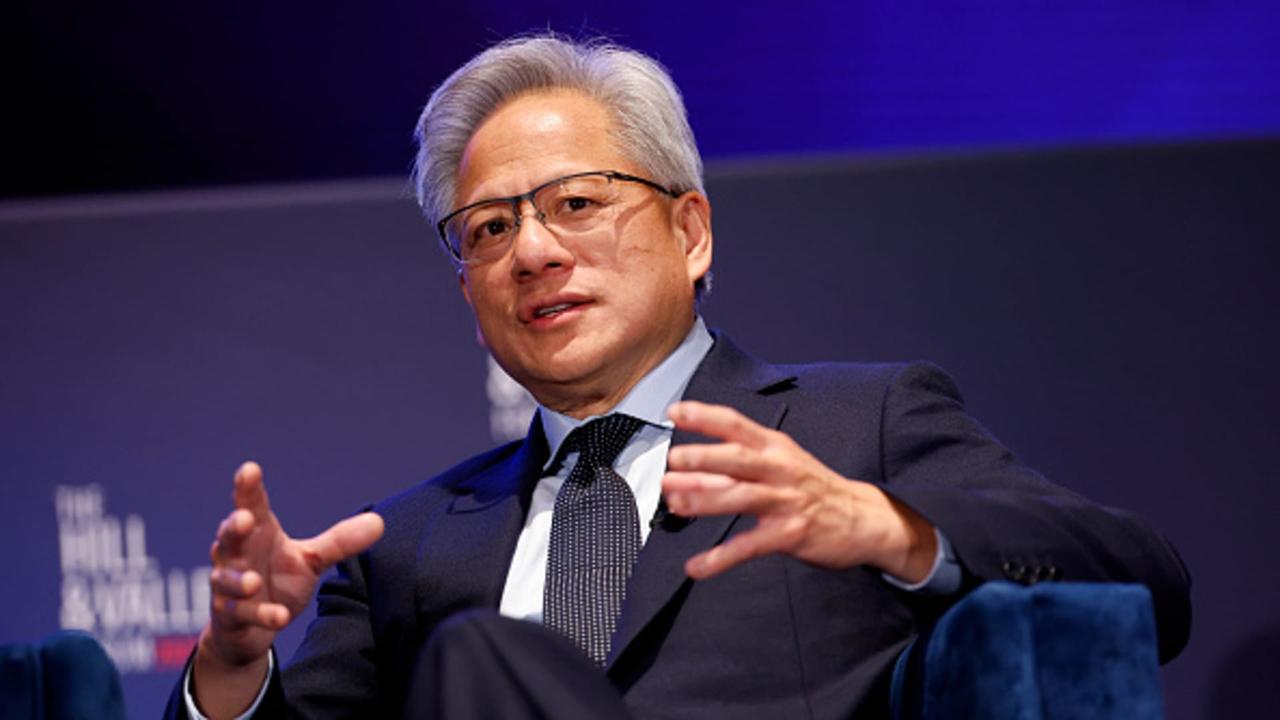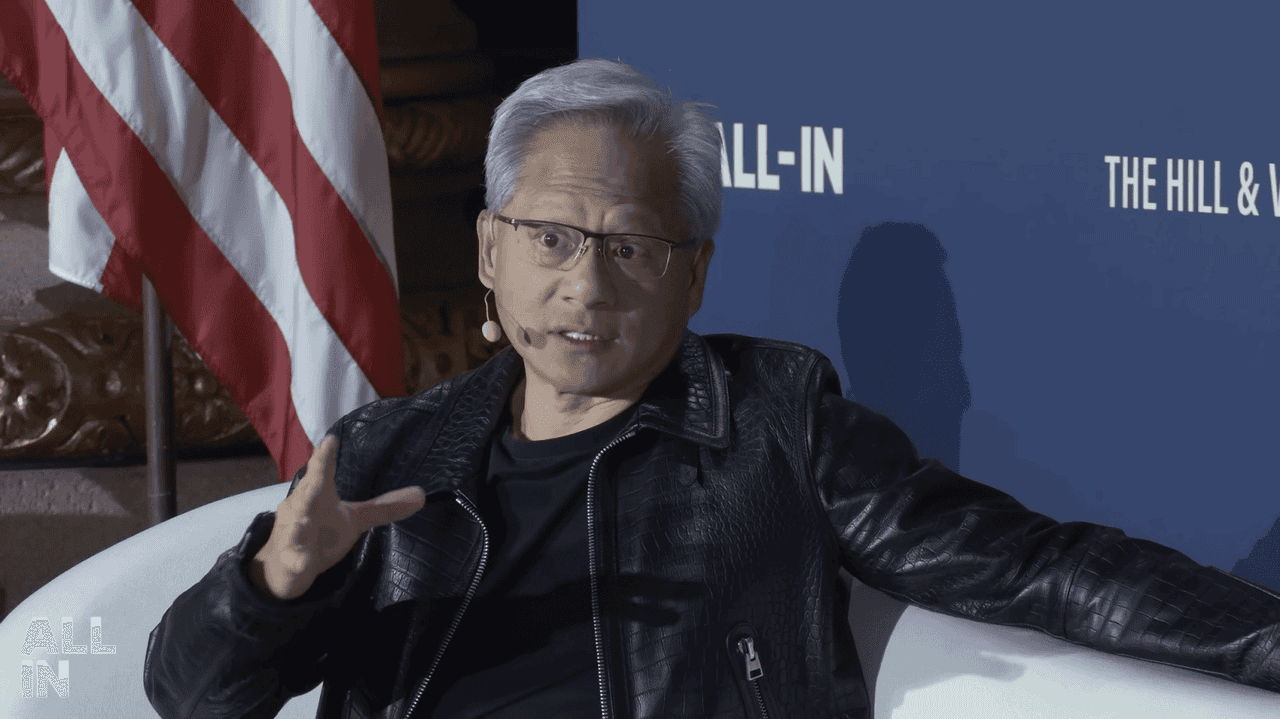Nvidia CEO Jensen Huang: AI Democratizes Programming with 'Human' as the New Language
4 Sources
4 Sources
[1]
The way you program an AI is like the way you program a person, says Nvidia's Huang
Nvidia CEO Jensen Huang says artificial intelligence is the "great equalizer" because it lets anyone program using everyday language. Speaking at London Tech Week on Monday, Huang said that, historically, computing was hard and not available to everyone. "We had to learn programming languages. We had to architect it. We had to design these computers that are very complicated," he said on stage alongside U.K. Prime Minister Kier Starmer. "Now, all of a sudden ... there's a new programming language. This new programming language is called 'human.'" Conversational AI models were thrown into the spotlight in 2022 when OpenAI's ChatGPT exploded onto the scene. In February, the San Francisco-based tech company said it had 400 million weekly active users. Users can ask chatbots, such as ChatGPT, Google's Gemini or Microsoft's Copilot, questions and they respond in a conversational way that feels more like talking to another human than an AI system.
[2]
Nvidia CEO: You now program AI the same way you talk to people
Nvidia CEO Jensen Huang stated at London Tech Week on Monday that artificial intelligence serves as an "equalizer," enabling users to program with natural language. Huang addressed the challenges of traditional computing, noting the necessity for specialized programming languages and complex computer architecture. He said, "We had to learn programming languages. We had to architect it. We had to design these computers that are very complicated." Huang introduced "human" as a new programming language, coinciding with the rise of conversational AI models after the debut of OpenAI's ChatGPT in 2022. ChatGPT reported 400 million weekly active users in February. Chatbots like ChatGPT, Google's Gemini, and Microsoft's Copilot allow users to pose questions and receive conversational responses, simulating human interaction. Huang emphasized that while expertise in languages like C++ or Python is limited, "everybody ... knows 'human'." Huang explained, "The way you program a computer today, to ask the computer to do something for you, even write a program, generate images, write a poem -- just ask it nicely." He further stated, "And the thing that's really, really quite amazing is the way you program an AI is like the way you program a person." U.K. and NVIDIA announce £1B AI push at London Tech Week Huang illustrated this by describing how to request a poem about the London Tech Week keynote speech: "You say: You are an incredible poet ... And I would like you to write a poem to describe today's keynote. And without very much effort, this AI would help you generate such a wonderful poem." He continued, "And when it answers ... you could say: I feel like you could do even better. And it would go off and think about it, and it'll come back and say, in fact, I can do better, and it does do a better job." These comments are concurrent with a growing trend of companies, including Shopify, Duolingo, and Fiverr, encouraging employees to utilize AI in their work. OpenAI reported having 3 million paying business users last week. Huang consistently promotes AI's capacity to enhance worker efficiency and advocates for its adoption to maintain employee value. He stated, "This way of interacting with computers, I think, is something that almost anybody can do, and I would just encourage everybody to engage it. Children are already doing that themselves naturally, and this is going to be transformative."
[3]
Nvidia's CEO Says It No Longer Matters If You Never Learned to Code: 'There's a New Programming Language'
The practice of coding by prompting an AI chatbot is known as "vibe coding." Nvidia CEO Jensen Huang says that you don't have to be an expert programmer to prompt AI to write a program for you, making AI the "great equalizer" when it comes to bringing ideas to life with code. In remarks on stage at London Tech Week on Monday, Huang said that the barrier to code used to be high. Programmers had to learn specific languages and figure out how to architect code efficiently. Related: Want to Get Hired at Nvidia? This Is the Most Important Part of the Interview Process, According to CEO Jensen Huang Now, Huang said that AI enables even non-programmers to write code using natural language. AI coding assistants like Cursor and Replit can easily take a written prompt in plain English and turn it into code. The practice of relying on these AI assistants to write a complete program is known as "vibe coding" -- and even Google CEO Sundar Pichai admitted last week to "vibe coding" a webpage. "Now, all of a sudden... there's a new programming language," Huang said at London Tech Week, per CNBC. "This new programming language is called 'human.'" Huang noted that while relatively few people know how to work with programming languages like C++ or Python, "everybody... knows 'human'." The way to ask a computer to write a program is to "just ask it nicely," as you would a person, Huang said. AI users are already following Huang's advice. ChatGPT users are saying "please" and "thank you" to the AI chatbot, treating it as politely as they would a person. The practice has a downside, though: ChatGPT-maker OpenAI has lost tens of millions of dollars in added electricity costs to process the politeness interactions. However, OpenAI CEO Sam Altman called it "tens of millions of dollars well spent." Related: How Nvidia CEO Jensen Huang Transformed a Graphics Card Company Into an AI Giant: 'One of the Most Remarkable Business Pivots in History' Non-coders are already tapping into AI to create projects and web apps without manually writing a single line of code. Kevin Roose, a technology columnist for The New York Times, wrote in February that he was able to vibe code a new app called LunchBox Buddy to help him figure out what he should pack his son for lunch based on a picture of his fridge. Harvard University neuroscience student, Rishab Jain, told NBC News last month that he vibe-coded an app to translate ancient texts into English. Nvidia is the second most valuable company in the world at the time of writing, with a market capitalization of $3.48 trillion. The AI chipmaker's stock has grown by nearly 1,500% in the past five years and over 17% this year.
[4]
AI speaks human, and has become the great equaliser: Nvidia CEO Jensen Huang
Nvidia CEO Jensen Huang, speaking at the recent London Tech Week, described AI as "the great equaliser" and explained why he sees it that way. He spoke about how, in the past, computing was something only a few million people had access to, mainly those who understood programming languages. "We had to learn programming languages. We had to architect it. We had to design these computers that are very complicated," he said. But this is no longer the case. "Now, all of a sudden, there's a new programming language. This new programming language is called 'human,'" he explained. "Most people don't know C++, very few people know Python, and everybody, as you know, knows human." Huang said programming AI has become as simple as giving instructions to a person. To illustrate this, he gave an example: "You say, 'You are an incredible poet. You are deeply steeped in Shakespeare, and I would like you to write a poem to describe today's keynote.' Without very much effort, this AI would help you generate such a wonderful poem." And just like with people, if you tell the AI it can do better, "it will 'think about it' and then go and do a better job", he added.
Share
Share
Copy Link
Nvidia CEO Jensen Huang discusses how AI has become a "great equalizer" by allowing anyone to program using natural language, transforming the way we interact with computers and create software.
AI as the 'Great Equalizer' in Programming
Nvidia CEO Jensen Huang has made a bold statement about the transformative power of artificial intelligence in the world of programming. Speaking at London Tech Week, Huang declared that AI has become the "great equalizer" by enabling anyone to program using everyday language
1
2
.
Source: ET
The Evolution of Programming Languages
Historically, computing was a complex field accessible only to those who could master specialized programming languages and intricate computer architectures. Huang explained, "We had to learn programming languages. We had to architect it. We had to design these computers that are very complicated"
1
. However, the landscape has dramatically shifted with the advent of AI.'Human' as the New Programming Language
Huang introduced a revolutionary concept: "Now, all of a sudden... there's a new programming language. This new programming language is called 'human'"
1
3
. This paradigm shift means that while relatively few people know complex programming languages like C++ or Python, "everybody... knows 'human'"2
4
.AI-Assisted Programming in Practice
The CEO illustrated this new approach with an example of how one might request an AI to write a poem about the London Tech Week keynote:
"You say: You are an incredible poet ... And I would like you to write a poem to describe today's keynote. And without very much effort, this AI would help you generate such a wonderful poem"
2
.The Rise of 'Vibe Coding'
This practice of using AI chatbots to write code is known as "vibe coding"
3
. It's gaining traction among both professionals and amateurs. Even Google CEO Sundar Pichai admitted to using this method to create a webpage3
.Real-World Applications
Non-coders are already leveraging AI to create projects without manually writing code. Examples include:
- Kevin Roose, a New York Times technology columnist, who created an app called LunchBox Buddy using AI assistance
3
. - Rishab Jain, a Harvard University neuroscience student, who developed an app to translate ancient texts into English
3
.
Related Stories
AI's Impact on Efficiency and Accessibility

Source: Entrepreneur
Huang consistently promotes AI's capacity to enhance worker efficiency and advocates for its adoption to maintain employee value. He stated, "This way of interacting with computers, I think, is something that almost anybody can do, and I would just encourage everybody to engage it"
2
.The Growing Trend of AI in the Workplace
This shift aligns with a growing trend of companies encouraging employees to utilize AI in their work. OpenAI reported having 3 million paying business users last week, indicating the rapid adoption of AI tools in professional settings
2
.Nvidia's Position in the AI Landscape
As the second most valuable company globally with a market capitalization of $3.48 trillion, Nvidia has seen tremendous growth. The AI chipmaker's stock has surged by nearly 1,500% in the past five years and over 17% this year alone
3
, underlining the significant impact of AI on the tech industry and Nvidia's pivotal role in this transformation.References
Summarized by
Navi
[3]
Related Stories
Nvidia CEO Jensen Huang Advocates for Personal AI Tutors, Predicting a Future of Enhanced Learning and Productivity
27 Feb 2025•Technology

Nvidia CEO Jensen Huang Advocates for AI Proficiency in Education and Career Development
18 May 2025•Technology

NVIDIA CEO Envisions AI Assistants for Everyone, Introduces 'Physical AI'
30 Jul 2024

Recent Highlights
1
ByteDance Faces Hollywood Backlash After Seedance 2.0 Creates Unauthorized Celebrity Deepfakes
Technology

2
Microsoft AI chief predicts artificial intelligence will automate most white-collar jobs in 18 months
Business and Economy

3
Google reports state-sponsored hackers exploit Gemini AI across all stages of cyberattacks
Technology





